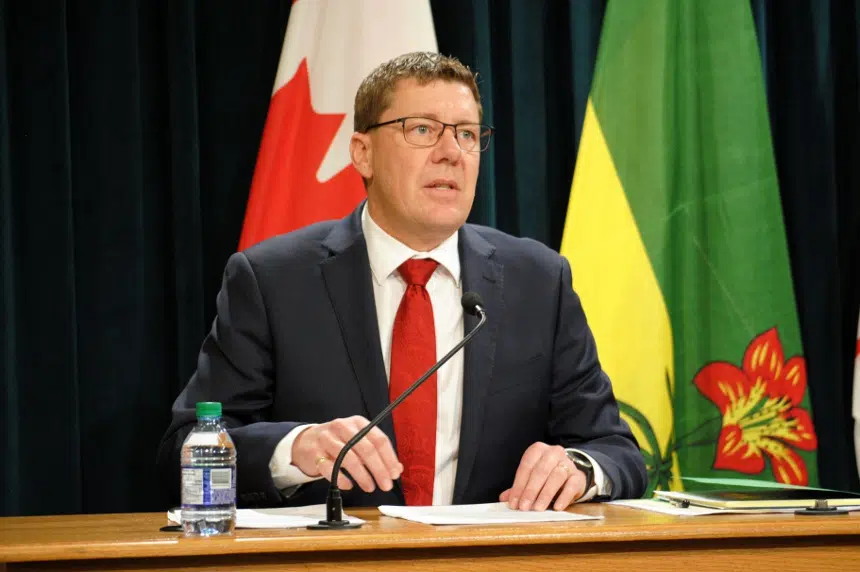Premier Scott Moe has a Christmas wish, but he’s also tempering his expectations.
During an appearance on Gormley on Monday, Moe discussed an earlier suggestion that COVID-19 restrictions could be relaxed so Saskatchewan residents can celebrate Christmas with family members.
Private indoor gatherings can include no more than five people, according to the public health orders put in place to limit the spread of the virus. Moe hopes restrictions will start to lower the daily case numbers, which could allow for some relaxation of restrictions — but he said it would be within reason.
“When we talk about opening some things up for Christmas, we need to keep this in check as to what we’re suggesting,” Moe said.
“Potentially (it could mean) a few more people that would be available to come into your home so that you could have maybe a child or two that aren’t living with you come for Christmas dinner or parents that may come for Christmas dinner. And (it could mean) trying to find a way with proper protection, (personal protective equipment) and otherwise, that maybe family members could get in and see their loved ones in a long-term care home over maybe a three-day period.
“We’re not talking about totally relaxing the restrictions that we have. We’re talking about giving some people some hope to see some family members that maybe they haven’t seen for the last 10 days and maybe even for some time previous to that. That is the goal and I’m hopeful we can still get there.”
As of Sunday, Saskatchewan had recorded a total of 10,139 COVID cases since March. The active caseload had risen in recent weeks and, as of Sunday, stood at 4,550.
There were 135 people in hospitals in the province, including 26 in intensive care.
The seven-day average of new cases was 272, up from 264 on Dec. 1. Moe said the increase in that number had slowed in recent weeks, which suggested to him the numbers were starting to plateau.
The Saskatchewan Health Authority last week revealed it was moving to the next phase of its surge plan, which would result in some service slowdowns in urban and rural areas.
It also would result in 600 staff members being moved to deal with COVID cases or to fill in for other health-care professionals who have either contracted the virus or are self-isolating.
“This is an unfortunate consequence of this second wave and when our community transmission rates have climbed a little bit high,” Moe said. “It’s not only in Saskatchewan. This has occurred in other areas of Canada and (some places in) North America have gone a lot further with their measures.”
On Monday, Prime Minister Justin Trudeau announced nearly 250,000 doses of Pfizer’s vaccine are to arrive in Canada by the end of the month. Moe’s government has a plan in place to start inoculating residents as soon as that vaccine — and others — arrive in the province, potentially in the first week of January.
“The sooner that we’re able to get them out in particular into the most vulnerable in our communities — those immunocompromised and elderly, long-term care residents and our health-care workers and our essential services — the quicker that we can go back to some degree of normalcy in this world and get back to focusing on some other challenges like the slow and moderate growth of our economy here in the province,” Moe said.
More information on vaccines in Saskatchewan will be available Tuesday, Moe said in a tweet.
Tomorrow, Saskatchewan will be providing a public briefing on the initial distribution of vaccines in our province. This will include details on the first phase of vaccine distribution and second phase planning scenarios for the wide availability of vaccines in Saskatchewan. 2/2
— Scott Moe (@PremierScottMoe) December 7, 2020
Moe’s government has been trying to maintain a balance between those who want to see a complete shutdown to control the spread of the virus and others who want current restrictions lifted.
Speaking to the latter group, Moe said the virus is a serious issue that requires following public health protocols. Doing so would allow even the most ardent opponent to potentially save their own family members who might be a susceptible.
And to those who want a shutdown — a so-called “circuit-breaker” — Moe once again offered a cautionary tale.
“It did work in I believe the state of Victoria in Australia,” he said. “It was 111 days. No businesses (were) open. You were locked in your home for 23 of 24 hours of the day. In that one hour, you were not allowed to go five kilometres from your home.
“A circuit-breaker like that, most certainly it will work, but that took 111 days with great impact to the economy (and) I would say great impact to people’s mental health. I think most certainly that is not the answer for us here in Saskatchewan.”







